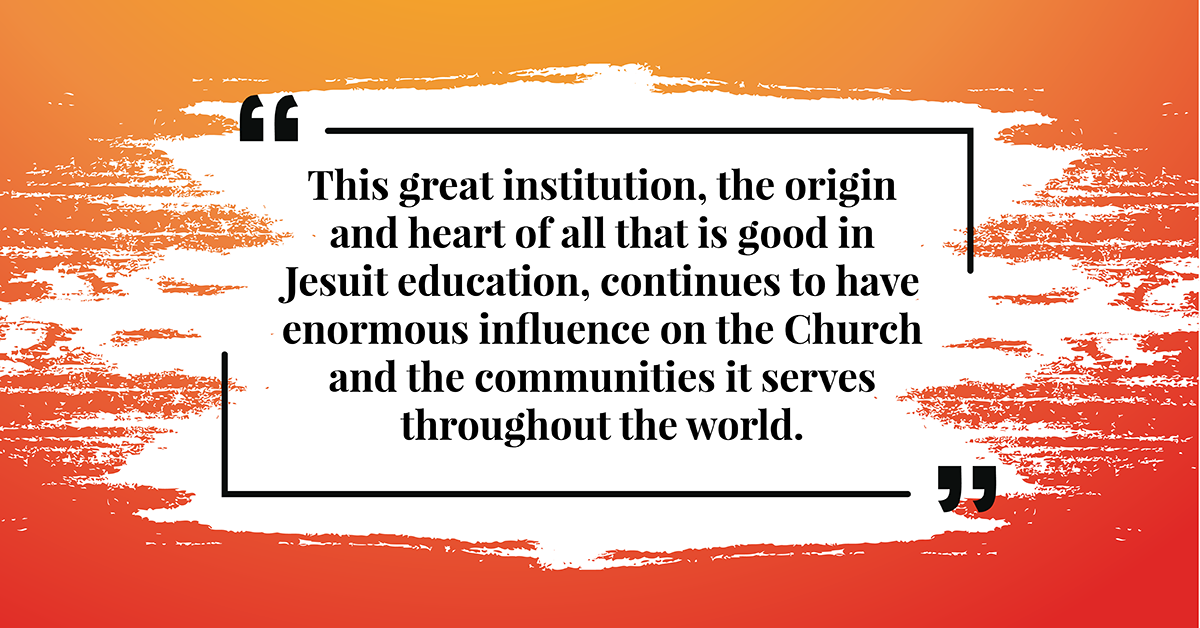
22 Aug August 2022 Reflection – Michael McFarland SJ
Crime and Punishment in the Catholic Church
In last month’s Gregorian University Foundation’s Distinguished Lecture, Rev. Robert Geisinger, SJ, canon law professor at the Gregorian University, who himself received his licentiate and doctorate in canon law at the Gregorian, spoke about the recent updates to the Church’s penal code. This might seem like an esoteric subject that has little to do with the lives of most Catholics; but, as Fr. Geisinger made clear, it is an essential part of the life of the Church and therefore impacts all of us.
Fr. Geisinger began with the letter of Pope Francis that announced the revision, which opened with a quote from the First Letter of St. Peter: “Tend the flock of God that is your charge, not by constraint but willingly, as God would have you.” This highlights the purpose of the law, which is fundamentally pastoral, to “manifest the maternal mercy of the Church, which is ever concerned for the salvation of souls.” In a time of great change, the revision is necessary, said the Pope, “so that the Church’s pastors can employ it as a more flexible means of correction and salvation, capable of being applied swiftly and with pastoral charity in order to avoid more serious evils and to bring healing to injuries caused by human weakness.”
Fr. Geisinger went on to explain the crimes or “delicts” covered by the law, the process for their fair and expeditious adjudication and the possible penalties. All of these are ordered toward the two objectives emphasized by Pope Francis, the “correction” of the offender and “to bring healing to injuries caused” by the offense. Thus some sanctions are meant to bring repentance and a change of behavior in the one responsible for the crime and are lifted once the desired change is effected. Others, however, are meant to provide justice for the victims as well as counter any scandal and restore order to the Church as a whole. These are more permanent. Finally, Fr. Geisinger highlighted what is new in the recent revision. This includes a stricter obligation for Church authorities such as bishops to initiate a judicial process when they become aware of a potential crime, no doubt in response to concerns that some bishops have failed to take action in response to allegations of abuse and other misconduct. The new language is also clearer about the need to restore justice for those who are harmed and to repair scandal. In general the changes are part of an effort to address the issues of authority, accountability and transparency. In this regard, Fr. Geisinger gave assurance that we are moving in the right direction, although there is more to do.
The lecture was brilliant – clear, engaging, and relevant. The feedback we received has been very appreciative. In addition to his great gifts as a teacher, Fr. Geisinger was able to bring unique understanding and credibility to the subject because of his current position as “Promoter of Justice” in the Vatican’s Congregation for the Doctrine of the Faith (CDF), which means that he is responsible for the adjudication of all cases brought to the Church’s central authority under the law.
This lecture was a compelling example of the importance of the Gregorian University for the Church. It took a difficult topic and made it very clear and relevant. It had great depth, going beyond specific cases and rules to get to the underlying principles, showing how the law is an expression and implementation of Gospel values. At the same time, it illustrated how the law helps form the life of the Church in its day-to-day reality and helps it maintain a just order in the face of challenges from both inside and outside. All of this is characteristic of the Gregorian’s education in general, giving future leaders the depth of understanding and practical experience they will need to guide the Church in fidelity to the mission entrusted to it by Christ. Moreover, Fr. Geisinger’s service in such a sensitive and important position in the Vatican is an example of the many ways in which the Gregorian’s faculty offer their expertise in direct service to the Church, in addition to their excellent teaching and mentoring of students. This great institution, the origin and heart of all that is good in Jesuit education, continues to have enormous influence on the Church and the communities it serves throughout the world.
Michael C McFarland, SJ
President, Gregorian University Foundation



